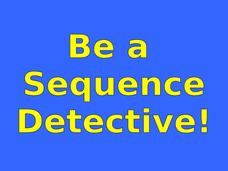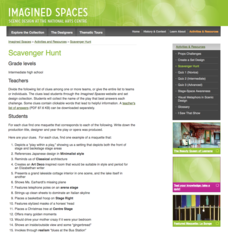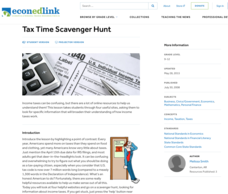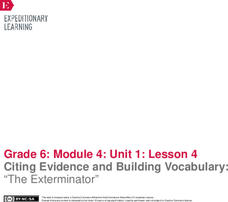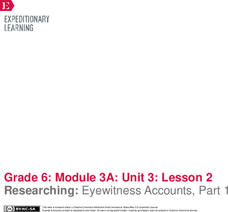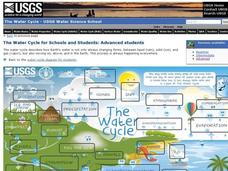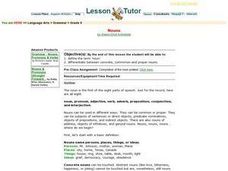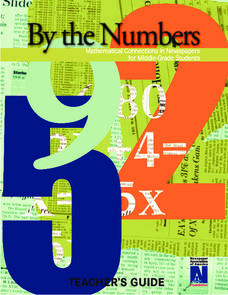Core Knowledge Foundation
Second Grade Skills Unit 4: The Job Hunt
Second graders practice skills, including spelling, grammar, and reading. Pupils examine vowel sounds and tricky words, nouns, and verbs. They begin the writing process by drafting a persuasive letter and decoding texts.
EngageNY
Synthesizing Text Details to Explain Relationships: “Hunting”
The class is on the hunt. Scholars read pages 22-23 of The Inuit Thought of It about different hunting techniques of the Inuit people. They sketch a picture of the gist of the section and then complete a web that shows the relationship...
Curated OER
Parrot in the Oven: Word Tree - Bonsai or Banyan
What fun! As part of a vocabulary exercise designed for Victor Martinez's Parrot in the Oven: Mi Vida readers create word trees with the trunk representing the root word and the branches representing prefixes that can be added to the...
EngageNY
Analyzing Powerful Language: Learning to Read
The power of a word. Readers learn the importance of word choice in shaping a text by using a Powerful Language T-chart to separate strong words and phrases from those that are more bland. They then complete a third read and question set...
Roanoke County Public Schools
Be a Sequence Detective!
Authors are constantly leaving clues that help the reader to understand the sequence of events in a story. Teach young readers how to pick up on these key temporal words and phrases with this slide show. After an introduction to commonly...
National Arts Centre
Scavenger Hunt
Young theatre artists engage in a scavenger hunt to acquaint themselves with set design. The challenge is to search the site and match a separate maquette with each of the 24 clues.
K12 Reader
Appositive Hunt
How do you find appositives? Why you look for clues, those words or phrases, set off by commas, that tell readers more about nouns. Young grammarians can practice finding them with this worksheet.
Council for Economic Education
Tax Time Scavenger Hunt
Is a 1040EZ tax form really easy? Scholars investigate the complexities of the United States taxation system with an economics lesson. Using a wide variety of web sources, they interpret IRS taxation rules and regulations to better...
Mrs. Burke's Math Page
Let Them Eat Pi
Looking for a fun and creative way to celebrate Pi Day? Then this is the resource for you. From a scavenger hunt and trivia contest to PowerPoint presentations and skills practice worksheets, this collection of materials is a...
University of North Carolina
Modals
If you could have any job in the world, what would it be? Modal verbs such as could and would express possibility, as the installment of a compilation of informational handouts describes. A series of tables help explain the strength,...
EngageNY
Citing Evidence and Building Vocabulary: “The Exterminator”
It is an out-of-body experience. Scholars take a look at the sidebars outside the body of the text in The Exterminator. They discuss the purpose of this type of text feature and work to determine the gist. Learners write unfamiliar...
English Enhanced Scope and Sequence
Identifying Synonyms
"Let the hunt begin!" As an introduction to synonyms, second graders generate a list of word pairs that have similar meanings. The words pairs are written on sentence strips, cut apart, shuffled, and distributed to class members who must...
EngageNY
Researching: Eyewitness Accounts, Part 1
Time to go on a quote hunt! Because learners cannot interview real eye witnesses for their newspaper articles, they read through text The Great Earthquake and Fires of 1906 looking for quotes to answer their questions. Learners complete...
EngageNY
Evaluating an Argument: The Joy of Hunting
After listening to "Interview with an Organic Farmer," class members identify the claim the farmer makes in his interview. They use lined paper to create a four-square organizer for relevant evidence, sufficient evidence, irrelevant...
Computer Science Unplugged
Treasure Hunt—Finite-State Automata
Introduce your class to the concept of finite-state automata with an activity that asks individuals to try to map their way to Treasure Island by taking different routes though an island chain. Each island has two ship sailing to...
Texas Education Agency (TEA)
Investigating Careers Using O*NET
Let's investigate! Scholars use the O*NET website to investigate career options and complete a scavenger hunt. They also embark on an in-depth career project, researching three careers and then preparing a cover letter, resume, letter of...
US Geological Survey
The Water Cycle for Schools: Advanced Ages
Explore the water cycle in an interactive diagram of the process. The diagram shows how water is a moving system and constantly changing forms. The resourc includes vocabulary words that pupils click on in order to discover more about...
Manitoba Education and Early Childhood Learning
A Foundation for Implementation
Color is the focus of this amazing resource packed with math, social studies, science, and language arts activities. Kids create a color word wall and post symbols, graph the number of objects they find of each color while on a treasure...
EngageNY
Introducing the Research Project: Asking the Right Questions
Road trip! Scholars take a look at a researcher's roadmap as they begin discussing the research process. They view the research performance task portion about Pygmalion, and then hunt for research process cards hidden under chairs. After...
EngageNY
Discussing and Identifying Themes: What Makes a Good Children’s Book?
Working in small groups, scholars look closely at a children's book to evaluate narrative techniques. Next, they complete a Children's Book Scavenger Hunt worksheet to analyze the literary elements of their selected stories.
EngageNY
Analyzing, Comparing, Sharing: Modern Voices
What do modern voices sound like? Scholars explore the topic, reading two concrete poems from John Grandit's Blue Lipstick and analyzing them using a graphic organizer. Next, they read a third poem and work with partners to look for...
Savvas Learning
Nouns
Singular and plural. Count and noncount. Nouns are the focus of this 19-page grammar packet. Language learners complete a series of exercises ranging from fill-in-the-blank questions to word puzzles and more in order to further their...
ESL Kid Stuff
Transport & Travel
Foot, bus, bicycle, boat. Transport and travel words are targeted in this plan designed for ESL/ELD classes. The packet is packed with practice exercises and performance prompts.
Newspaper Association of America
By the Numbers: Mathematical Connections in Newspapers for Middle-Grade Students
A cross-curricular resource teaches and reinforces mathematical concepts with several activities that use parts of a newspaper. Scholars use scavenger hunts to find the different ways math is used in the paper along with using data...
Other popular searches
- Animals Word Hunt
- Word Hunt Activity
- Dictionary Word Hunt
- Word Hunt and Phonics
- Halloween Word Hunt
- Literature Word Hunt






